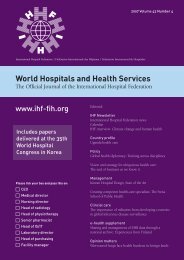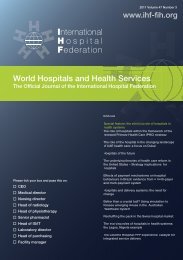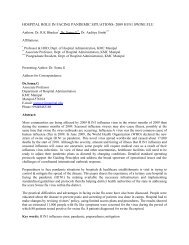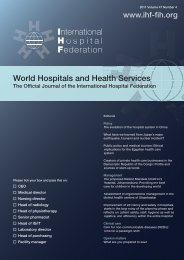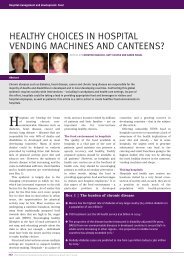World Hospitals and Health Services - International Hospital ...
World Hospitals and Health Services - International Hospital ...
World Hospitals and Health Services - International Hospital ...
You also want an ePaper? Increase the reach of your titles
YUMPU automatically turns print PDFs into web optimized ePapers that Google loves.
E-HEALTH SUPPLEMENT: CANADIAN PERSPECTIVE<br />
<strong>and</strong> no intercity roads. These factors pose serious challenges<br />
to the provision of equitable, accessible <strong>and</strong> high quality care.<br />
The political structure of funding health services is a<br />
complicating factor <strong>and</strong> a matter currently of intense scrutiny<br />
<strong>and</strong> considerable controversy. The division of both political,<br />
managerial <strong>and</strong> fiscal accountability across provincial <strong>and</strong><br />
federal lines has created tensions, particularly around the<br />
question of the current level, <strong>and</strong> most appropriate future<br />
level of funding.<br />
The demographic <strong>and</strong> human resource picture illustrates<br />
other challenges to health care. Seniors constitute one of the<br />
fastest growing groups in Canadian society. By 2041, about<br />
23% of the population will be over 65, up from 12% in 1995.<br />
This growing portion of the population will inevitably require,<br />
it is assumed, the devotion of a larger proportion of expensive<br />
health resources (Statistics Canada, January 2002). Within<br />
the various health professions there are challenges related to<br />
numbers of providers, <strong>and</strong> their distribution. It is a common<br />
<strong>and</strong> significant problem that many areas of the country remain<br />
un- or under-serviced even though there is a high proportion<br />
of professionals to general population. Canada is a country of<br />
cultural diversity, which has created some unique health<br />
challenges. From the last full national census, of 30 million<br />
people, 18 million speak English, 7 million French <strong>and</strong> 5<br />
million have a mother-tongue other than English or French<br />
(official languages). Not being able to speak either official<br />
language is an enormous obstacle for newcomers when<br />
seeking out or obtaining health care. The various rights of<br />
English or French speaking minorities to care in their own<br />
language directly impacts on government planning, fiscal<br />
considerations <strong>and</strong> distribution of services (which may<br />
overlap in kind, but differ in language).<br />
Total health care spending was $114 billion in 2002 <strong>and</strong><br />
reached an estimated $123 billion in 2003 (current dollars),<br />
representing annual increases of 7.3% <strong>and</strong> 7.9%, respectively<br />
(CIHI, December 2004). The amount of federal funding <strong>and</strong><br />
the proportion of federal vs provincial/territorial spending is at<br />
issue. Arguments abound about it being less or more than it<br />
was or should be, <strong>and</strong> whether it must increase or decrease.<br />
Is the growth sustainable? Are the private/public <strong>and</strong><br />
federal/provincial funding proportions appropriate? There are<br />
many questions being considered. Alternative funding <strong>and</strong><br />
management models are being actively explored <strong>and</strong><br />
implemented at all levels of government.<br />
The history of Canada’s Medicare system, our geography,<br />
political structure, demography <strong>and</strong> finances are exerting<br />
pressures for change on the delivery of health care. Federal,<br />
provincial <strong>and</strong> territorial governments are struggling to renew<br />
or reinvent the health care system to make it ‘affordable’ while<br />
also living up to the commitments to <strong>and</strong> expectations for a<br />
public, accessible, comprehensive, universal <strong>and</strong> high quality<br />
health care system. In this context, advances in ICT, <strong>and</strong> the<br />
subsequent interest in e-health holds much promise in<br />
mitigating if not eliminating, a number of the challenges faced<br />
by our current <strong>and</strong> much valued health care system.<br />
Discussion<br />
Supporters of e-health initiatives generally recognise that<br />
advances in ICT, the wide-scale review of the health system,<br />
<strong>and</strong> the increasing interest in exploring new approaches to<br />
health care delivery, financing <strong>and</strong> management can benefit<br />
the continued development of e-health initiatives. It can be<br />
argued, as this author does, that e-health initiatives in Canada<br />
can play a significant role in mitigating the impact of some of<br />
the challenges to the system described above, if not eliminate<br />
many of them from the debate altogether. <strong>Health</strong> data is<br />
already essential to health services resource planning in<br />
Canada. It can also play a substantial role in reducing<br />
duplication of services, realising operational efficiencies, <strong>and</strong><br />
improving the overall quality of health care.<br />
Promise of e-health<br />
But what exactly is e-health, <strong>and</strong> what is exactly is its promise?<br />
The term e-health has been used to describe a variety of<br />
activities including almost any electronic exchange of healthrelated<br />
data, voice or video. The definition that most nearly<br />
describes what is understood within the context of this article<br />
is the following:<br />
‘e-<strong>Health</strong> is a consumer-centred model of health care where<br />
stakeholders collaborate, utilising ICTs, including Internet<br />
technologies, to manage health, arrange, deliver <strong>and</strong> account<br />
for care, <strong>and</strong> manage the health care system’ (Ontario<br />
<strong>Hospital</strong> e-<strong>Health</strong> Council)<br />
While definitions of what correctly falls within the scope of<br />
e-health may vary, what is consistent is the excitement around<br />
perceived benefits <strong>and</strong> the rush to move forward with<br />
collaborative opportunities using advanced technologies in<br />
health information.<br />
e-<strong>Health</strong> has almost no ‘history’, nor baggage, as it enters<br />
the health care discussion. It offers a means to draw together,<br />
in collaborative partnerships, governments, organisations <strong>and</strong><br />
professionals in ways that have not before been possible.<br />
Numerous stakeholders, including consumers, clinicians,<br />
administrators <strong>and</strong> politicians, are already actively involved in<br />
e-health initiatives.<br />
ICTs are able to reduce the effects of geographic isolation,<br />
harsh climate <strong>and</strong> low population densities by providing a<br />
mechanism for remote data access, health-information sharing<br />
<strong>and</strong> medical support; as well as clinical examination,<br />
diagnosis <strong>and</strong> treatment: bringing the health system <strong>and</strong><br />
health care provider to the patient.<br />
ICTs in e-health initiatives increase our ability to meet<br />
challenges in the provision of primary <strong>and</strong> tertiary care.<br />
Subsequently, they may reduce or prevent adverse patient<br />
outcomes, reduce costs to the system of repeat diagnostic<br />
testing, redundant record-keeping, <strong>and</strong> high travel costs<br />
associated with seeking <strong>and</strong> receiving care in centres located<br />
far from the patient.<br />
Various new ICTs transcend traditional health system<br />
divides, offering a means to develop more complicated <strong>and</strong><br />
advanced data sharing, cooperation <strong>and</strong> cost-sharing between<br />
jurisdictions, professionals <strong>and</strong> facilities. Political concerns<br />
about health system financing, viability <strong>and</strong> sustainability are<br />
moderated by the potential for cost- <strong>and</strong> risk-sharing provided<br />
by ICTs <strong>and</strong> e-health initiatives.<br />
The question of the provision of quality health services to a<br />
multi-lingual <strong>and</strong> multi-ethnic population are also met in part<br />
by e-health. The financial stress being felt by a burgeoning<br />
32 | <strong>World</strong> <strong><strong>Hospital</strong>s</strong> <strong>and</strong> <strong>Health</strong> <strong>Services</strong> | Vol. 40 No. 4



